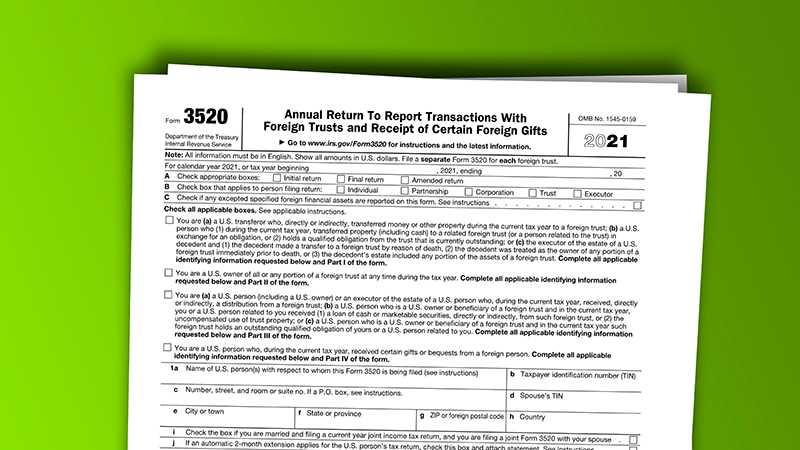Recognizing the Relevance of Reporting Foreign Inheritance to IRS for Tax Obligation Conformity
Maneuvering the intricacies of international inheritance calls for a clear understanding of IRS reporting commitments. Several individuals ignore the relevance of precisely reporting these properties, which can lead to unexpected consequences. Failing to adhere to IRS policies may result in significant fines and lawful problems. It is important to grasp the subtleties surrounding foreign inheritances to stay clear of challenges. The complying with areas will clarify important aspects of conformity and the possible dangers involved.

What Constitutes Foreign Inheritance?
When a specific obtains assets from a deceased individual's estate situated outside of the USA, this transfer is thought about an international inheritance. Foreign inheritances can include different kinds of assets such as property, bank accounts, investments, individual belongings, and company passions. The value and nature of these properties may vary considerably relying on the legislations and custom-mades of the country in which the estate lies.
In addition, the process of obtaining these possessions can entail navigating with foreign legal systems, which may enforce details demands or taxes connected to inheritance. The recipient might additionally come across challenges in identifying the reasonable market price of the inherited assets, especially if they are not acquainted with the local realty or economic markets. Recognizing what comprises a foreign inheritance is essential for people to ensure conformity with both local regulations and any kind of potential commitments they may have in their home country.
IRS Coverage Requirements for Foreign Inheritance
Just how does one guide with the IRS coverage requirements for foreign inheritance? Individuals who get an inheritance from abroad needs to know details reporting commitments to ensure conformity with IRS policies. The Foreign Financial Institution and Financial Accounts Report (FBAR) is one vital need; if the total worth of international accounts goes beyond $10,000 at any moment throughout the year, it should be reported. Additionally, Type 3520 may be required for reporting foreign presents or inheritances over $100,000 from non-U.S. individuals. This form catches details regarding the inheritance, including the source and amount. Falling short to abide by these coverage needs can lead to substantial fines. It is crucial for receivers to keep detailed documents of the inheritance, including any type of documents from foreign entities. Consulting with a tax expert well-informed regarding global tax obligation laws can supply additional guidance in guiding via these reporting responsibilities properly.
Tax Obligation Effects of Obtaining an Inheritance From Abroad
Obtaining an inheritance from abroad can bring substantial tax effects for individuals, especially as they navigate the intricacies of global tax legislations. The IRS calls for U.S. people and homeowners to report international inheritances, which might trigger different tax obligation obligations - penalties for not filing Form 3520. Although inheritances themselves are normally ruled out taxed revenue, coverage is vital to avoid charges
In addition, the estate may be subject to estate taxes in the foreign nation, which might influence the web value obtained by the successor. If the inheritance includes international assets, such as realty or investments, they may come with one-of-a-kind tax factors to consider, including possible funding gains taxes upon sale.
Furthermore, individuals might need to follow international tax obligation laws, which can vary substantially from U.S. laws. Understanding these implications is vital for appropriate tax conformity and to guarantee that all commitments are satisfied without incurring unneeded costs or lawful issues.
Usual Errors to Stay Clear Of When Reporting Inheritance

Actions to Ensure Compliance With IRS Rules
Comprehending the steps necessary to guarantee conformity with IRS laws is important for anyone reporting an international inheritance. Individuals must validate whether the inheritance goes beyond the reporting limit, which can trigger added needs. Next off, it is important to gather all appropriate paperwork, consisting of the will, depend on records, and records of the international estate's worth.
Submitting Form 3520, which particularly resolves international presents and inheritances, is important to notify the IRS of the inheritance. Individuals have to likewise make sure that any kind of relevant tax obligations connected to the inheritance are paid, consisting of possible inheritance tax in the international jurisdiction.
Furthermore, keeping accurate records of all interactions and purchases concerning the inheritance can offer necessary support in situation of an IRS questions. Looking for professional suggestions from a tax obligation expert acquainted with international tax obligation regulations can further improve compliance and minimize dangers associated with reporting foreign inheritances.
Often Asked Concerns

What Happens if I Fail to Report My International Inheritance?
Falling short to report a foreign inheritance can bring about significant charges, rate of interest on unpaid tax obligations, and potential legal consequences. The IRS might seek enforcement actions, complicating future monetary negotiations and compliance obligations for the individual involved.
Can I Deduct Costs Connected To Receiving Foreign Inheritance?
No, expenditures connected to getting a foreign inheritance are usually not insurance deductible for tax purposes. Inheritance itself is usually ruled out taxable revenue, and linked prices can not be asserted to minimize tax obligation.
Are There Penalties for Late Reporting of Foreign Inheritance?
Yes, there are charges for late coverage of foreign inheritance to the IRS - penalties for not filing Form 3520. These can include penalties and interest on unpaid taxes, making prompt disclosure necessary for compliance and staying clear of additional monetary problems
Exactly How Does Foreign Inheritance Affect My State Taxes?
International inheritance might impact state tax obligations differently depending on jurisdiction. Some states read review impose inheritance or estate taxes, while others do not. It is necessary to consult local regulations to establish particular tax effects connected to foreign inheritance.
Are Gifts From Abroad Considered Foreign Inheritance for IRS Purposes?
Presents from abroad are not identified as international inheritance for IRS purposes. Form 3520 foreign gift. Rather, they are dealt with individually under gift tax laws, with various coverage demands and limits that individuals should abide by for compliance
Furthermore, the process of getting these properties can entail maneuvering with foreign legal systems, which could enforce details needs or taxes connected to inheritance. The Internal revenue service needs U.S. residents and people to report foreign inheritances, which might set off numerous tax obligation commitments. Submitting Form 3520, which particularly deals with foreign presents and inheritances, is necessary top article to inform the Internal revenue service of the inheritance. Falling short to report a foreign inheritance can lead to substantial fines, passion on unsettled tax obligations, and potential lawful effects. No, costs connected to receiving an international inheritance are usually not deductible for tax purposes.